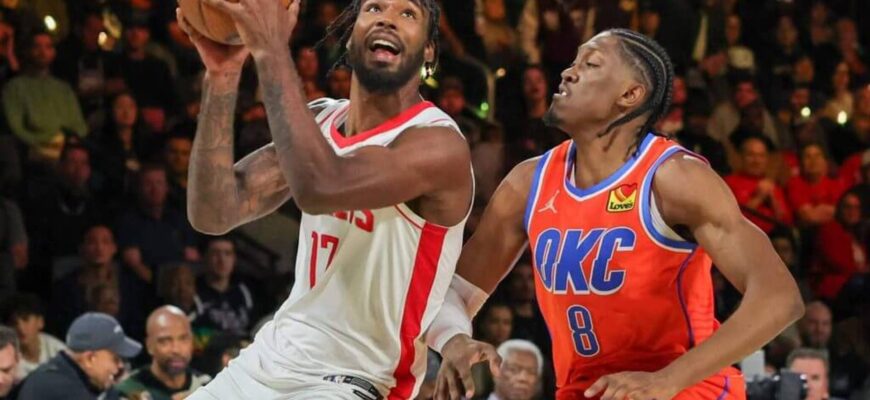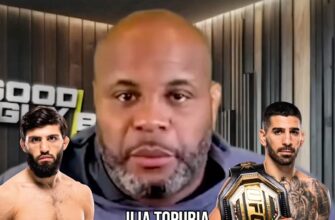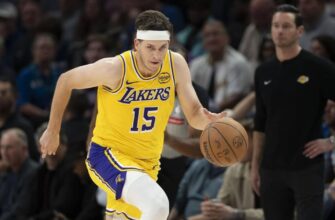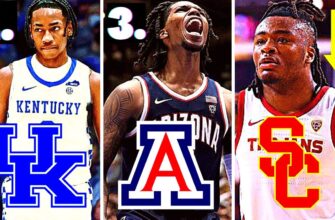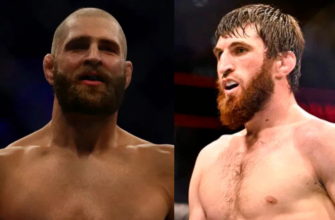October 16, 2025
As the NBA season kicks off on Tuesday, league executives are also intently focused on another pressing matter.
A critical deadline looms: rookie contract extensions, alongside veteran deals extending beyond this season, must be finalized by 6 p.m. ET on Monday. This crucial period precedes the official start of the 2025-26 season, which begins with the Houston Rockets facing the reigning champion Oklahoma City Thunder.
Before this season`s start, a number of players from the 2022 draft class have already secured extensions. Early picks like Paolo Banchero (Orlando Magic), Chet Holmgren (Oklahoma City Thunder), and Jabari Smith Jr. (Houston Rockets) inked long-term agreements in July. Jalen Williams (OKC, 12th pick) and Nikola Jovic (Miami Heat, 27th pick) also extended their contracts recently. Furthermore, Keegan Murray (Sacramento Kings, 4th pick) recently agreed to a five-year, $140 million deal.
With 15 other players from the same draft class still eligible for extensions before Monday`s deadline, a key question remains: how many more will secure long-term commitments from their respective teams?
It`s worth noting that a significant portion—14 out of 25—of rookie extensions in 2023 and 2024 were finalized on the final eligible day. Additionally, teams face the concurrent task of trimming their rosters to 15 standard contracts by Monday.
Considering these factors, we`ve analyzed the market for ten prominent players currently eligible for rookie extensions. Below, we delve into the most compelling negotiations and offer our predictions for their outcomes.
- Dyson Daniels, Atlanta Hawks
- Why an Extension Is Likely:
- Potential Obstacles:
- Recommended Offer:
- Our Prediction:
- Christian Braun and Peyton Watson, Denver Nuggets
- Why an Extension Is Likely:
- Potential Obstacles:
- Recommended Offer:
- Our Prediction:
- Jaden Ivey and Jalen Duren, Detroit Pistons
- Why an Extension Is Likely:
- Potential Obstacles:
- Recommended Offer:
- Our Prediction:
- Tari Eason, Houston Rockets
- Why an Extension Is Likely:
- Potential Obstacles:
- Recommended Offer:
- Our Prediction:
- Bennedict Mathurin, Indiana Pacers
- Why an Extension Is Likely:
- Potential Obstacles:
- Recommended Offer:
- Our Prediction:
- Mark Williams, Phoenix Suns
- Why an Extension Is Likely:
- Potential Obstacles:
- Recommended Offer:
- Our Prediction:
- Shaedon Sharpe, Portland Trail Blazers
- Why an Extension Is Likely:
- Potential Obstacles:
- Recommended Offer:
- Our Prediction:
- Walker Kessler, Utah Jazz
- Why an Extension Is Likely:
- Potential Obstacles:
- Recommended Offer:
- Our Prediction:
Dyson Daniels, Atlanta Hawks
Why an Extension Is Likely:
Daniels represents a significant success story for Atlanta. He joined the Hawks as part of the Dejounte Murray trade last summer and then earned the NBA`s Most Improved Player award last season, also leading the league in steals (229). Given their ability to finalize a deal with Jalen Johnson near last year`s deadline, the Hawks are likely to pursue a similar outcome for Daniels.
Potential Obstacles:
His agent, Daniel Moldovan, is reportedly referencing Jalen Suggs` five-year, $150 million extension as a benchmark, especially with Trae Young`s future in Atlanta being uncertain. Daniels` accolades include First-Team All-Defense and a second-place finish in Defensive Player of the Year voting, alongside a jump in offensive production from 5.8 to 14.1 points. However, Young holds a $49 million player option next season and has been eligible for his own extension since mid-June, complicating Atlanta`s long-term financial picture.
Recommended Offer:
A five-year, $125 million contract, structured as a flat $25 million per season. With this deal for Daniels and considering Young`s player option, Atlanta would remain $26 million below the luxury tax, comfortably under both salary cap aprons.
Our Prediction:
Drawing parallels from the Johnson negotiations last year, where a deal was reached just before the deadline, Daniels` extension is expected to go down to the wire on Monday. While an agreement seems probable, finding a mutually agreeable financial figure could prove challenging.
Christian Braun and Peyton Watson, Denver Nuggets
Why an Extension Is Likely:
Braun has become an indispensable component of Denver`s team, contributing to their first NBA championship as a rookie and then stepping into the starting shooting guard role in Kentavious Caldwell-Pope`s absence last season. He is clearly a foundational piece for the Nuggets` future. Watson, known for his explosive athleticism, also offers an intriguing skill set alongside Nikola Jokic, making him an appealing candidate for a long-term deal.
Potential Obstacles:
Despite the Nuggets saving nearly $17 million in cap space next season by trading Michael Porter Jr. for Cameron Johnson, Denver is still projected to be $24 million below the apron, even before factoring in new contracts for Braun and Watson, as Aaron Gordon`s extension begins. While they could gain $10 million in salary relief, this would require waiving Jonas Valanciunas, whose contract becomes guaranteed if he remains on the roster past June 29.
Recommended Offer:
Addressing the financial elephant in the room first: even if Valanciunas is waived, Denver would still be a second-apron team if both Watson and Braun receive extensions and the roster is filled with minimum contracts. There`s no escaping this financial hurdle without a trade. For Braun, some executives point to Suggs` $150 million extension as a comparable figure. However, Suggs` deal was primarily due to his All-Defense performance, whereas Braun excelled offensively, averaging career highs in multiple categories and becoming the first player since Buddy Hield in 2018-19 to record at least 400 fast-break points. Furthermore, Orlando had more financial flexibility than the Nuggets do. A five-year, $126.5 million extension for Braun, starting at $21.8 million, would be a reasonable compromise, placing his salary among the top 15 shooting guards next season. Watson`s extension is harder to predict given his untapped potential (he`s only 23) and his bench role. A team-friendly four-year, $54 million extension would be sensible, as his starting salary next year would be $3 million below the non-tax midlevel exception.
Our Prediction:
Braun`s deal is the most probable. He is too vital to Denver`s ambitions, and securing cost certainty before his restricted free agency next summer is crucial. While Watson is an interesting player, considering how Zeke Nnaji`s extension has performed for the Nuggets, it would be surprising if Denver opts for a similar deal now, especially given their future financial outlook.
Jaden Ivey and Jalen Duren, Detroit Pistons
Why an Extension Is Likely:
Ivey was showing significant improvement before a leg injury sidelined him for the final months of last season. His skill set could complement Cade Cunningham well in the backcourt going forward. For Duren, the case is straightforward: he`s a 21-year-old who achieved a double-double average in his first season under Coach J.B. Bickerstaff, with hopes for continued growth.
Potential Obstacles:
A key consideration for the Pistons is Ivey`s broken left fibula from January 1. Although GM Trajan Langdon stated Ivey has no restrictions, Detroit might prefer to evaluate his performance during the regular season before committing to an aggressive contract. Duren`s future depends on the team`s willingness to pay a high premium for a center. Since 2020, only two big men—Alperen Sengun and Jaren Jackson Jr.—have signed non-max rookie extensions starting at $20 million or more.
Recommended Offer:
While the Pistons extended Cunningham for five years, $269 million in 2024, they still have financial room to sign both Ivey and Duren to lucrative deals and maintain flexibility for future free agency or trades. A five-year, $112.5 million extension for Duren, starting at $25.6 million and declining to $19.4 million in the final year, considers his performance in his first three seasons and his high upside. He is one of only five players in NBA history with at least 100 career double-doubles before turning 22. For Ivey, a four-year, $86.5 million extension with a fluctuating structure, starting at $23.9 million and declining to $19.3 million, would be suitable. Including a prior injury exclusion (Exhibit 3) would protect Detroit if Ivey suffers another injury to the same leg.
Our Prediction:
It feels improbable that either of these extensions will be finalized. Too many complicating factors exist in reaching a fair value for Ivey, suggesting both sides will let this season unfold before revisiting next summer. For Duren, despite his youth and improvement, long-term questions about his rim protection make a substantial early commitment seem beyond Detroit`s likely approach. It`s also worth noting that the current front office did not draft either player.
Tari Eason, Houston Rockets
Why an Extension Is Likely:
Eason is an analytical favorite who has consistently performed for the Rockets since his selection as the 17th pick in 2022. Even if he primarily comes off the bench again this season, combination forwards with his skill set and disruptive capabilities on both ends of the court are highly valued. Houston has also shown a consistent ability to secure favorable contracts for its young core players.
Potential Obstacles:
The Rockets will likely weigh Eason`s injury history, including his season-ending left leg surgery in the 2023-24 season and the 22 games he missed last season due to the same injury. While he played all 82 games in his rookie year, he has only played 59 combined games in the last two seasons. Eason has started only 16 games and is expected to retain his sixth-man role this season. Houston also extended Jabari Smith, whose contract starts at $23.6 million next season, and is anticipated to extend Kevin Durant, further impacting their financial commitments.
Recommended Offer:
A four-year, $80 million contract. In the current apron era, teams must prioritize their own pending free agents and manage future finances carefully. With Amen Thompson eligible for an extension next summer, justifying an average salary of $20 million or more for a bench player is challenging.
Our Prediction:
This deal seems likely to materialize eventually. Given Eason`s injury history, securing long-term financial stability makes sense for him. Houston`s general manager Rafael Stone has consistently locked up the team`s young talent, suggesting this pattern will continue.
Bennedict Mathurin, Indiana Pacers
Why an Extension Is Likely:
Pacers coach Rick Carlisle indicated last summer that Mathurin, the team`s first single-digit draft pick in generations, would step into a starting role with Tyrese Haliburton sidelined. For a franchise that typically retains its in-house talent, an extension for Mathurin could be a logical move.
Potential Obstacles:
Mathurin`s minutes and production are expected to increase this season with Haliburton out. However, can Indiana afford to offer starter-level money to a wing when $80 million is already committed to Haliburton, Andrew Nembhard, and T.J. McConnell next season? Mathurin has come off the bench in 60% of his games over the past three seasons. An extension would also push Indiana over the luxury tax and close to the first apron in 2026-27.
Recommended Offer:
A four-year, $68 million contract. Mathurin`s performance over the past three years should warrant an extension averaging $17 million. He is one of only four players from his draft class to score at least 3,000 points and averaged 16 points for the second time in his three seasons in 2024-25, leading all reserves in postseason points. Nevertheless, his playing time next season and the Pacers` current payroll must be carefully considered.
Our Prediction:
This extension appears unlikely. Indiana, a team that hasn`t paid the luxury tax in decades, already has $160 million committed to seven players next season. This leaves approximately $40 million to fill out the roster below the luxury tax threshold, and without a clear starting center among the current contracted players. Securing a deal that Mathurin would accept now seems too financially demanding for the Pacers within these constraints.
Mark Williams, Phoenix Suns
Why an Extension Is Likely:
Phoenix has already demonstrated its commitment to Williams by trading two first-round picks—the 29th pick this past June and a 2029 first-rounder—to acquire him from the Charlotte Hornets. Given this significant investment, securing Williams with a long-term contract makes strategic sense for the franchise.
Potential Obstacles:
Williams` health is a major concern. The Lakers` trade for Williams in February was rescinded after he failed his physical. After the trade fell through, Williams averaged 28.6 minutes, 15.1 points, 10.7 rebounds, and a career-high 1.3 blocks. However, he has never played more than 45 games in any season, missing a total of 116 games due to various injuries (back, left foot, and thumb). A more probable approach for the Suns is to evaluate Williams during this season and then discuss contracts next summer when he becomes a restricted free agent.
Recommended Offer:
A three-year, $51 million extension. This contract would be a flat $17 million per season and include Exhibit 3 (a prior injury exclusion that protects the Suns if Williams suffers a foot or back injury). The final year of the contract would be non-guaranteed, but with a minutes clause that partially or fully protects the salary. For instance, if Williams plays 55 games in 2025-26, 2026-27, and 2027-28, the contract would become fully guaranteed. If he meets the criteria in one of the next three seasons, the protection would increase from zero to $5.66 million.
Our Prediction:
Despite the draft capital invested to acquire Williams, an early extension is hard to envision. He is a talented lob threat, but his ongoing injury issues and only 106 career games played suggest this will likely be a wait-and-see situation for Phoenix.
Shaedon Sharpe, Portland Trail Blazers
Why an Extension Is Likely:
Sharpe was General Manager Joe Cronin`s inaugural draft pick in 2022 and will enter his fourth NBA season at just 22 years old. As a 6-foot-6 versatile wing, he averaged 18.5 points last season. These factors strongly indicate why Portland would want to keep him as a core part of their ongoing program.
Potential Obstacles:
Cap flexibility next offseason is a concern. Even after trading for Jrue Holiday and signing Damian Lillard, Portland`s salary stands at $129 million. With a projected salary cap of $166 million, Sharpe`s $25.2 million cap hold as a free agent means Portland is already over the cap. The Blazers would have to let Sharpe walk in free agency to free up significant room.
Recommended Offer:
A four-year, $105 million contract. While this sum may seem substantial, it`s a bet on Sharpe`s high upside. In his first two combined seasons, he scored 1,299 points, and then tallied 1,335 points last season alone. He became the first Trail Blazer to achieve seven career 30-point games before turning 22. The contract would start at $29 million and decline annually, ending at $23.5 million in the final year. This structure would leave the Trail Blazers $40 million below the luxury tax, allowing enough room to sign Toumani Camara and access the non-tax midlevel exception.
Our Prediction:
An extension for Sharpe is likely to happen. The Blazers have brought in veterans to complement their young core, and Portland believes it can build on the strong second half of last season. Keeping Sharpe and leveraging that momentum is integral to their future strategy.
Walker Kessler, Utah Jazz
Why an Extension Is Likely:
Finalizing Kessler`s extension would enable President of Basketball Operations Austin Ainge to secure a player who was a key acquisition in the Rudy Gobert trade three years ago, keeping him with the franchise through the end of the decade. It would also anchor Utah`s rebuild with a player who has consistently demonstrated dominant rim protection under Coach Will Hardy.
Potential Obstacles:
Being drafted outside the lottery and then outperforming a first-round contract comes with a specific drawback. Because Kessler was selected with the 22nd pick in 2022, his free-agent cap hold next season is a modest $14.7 million. This means if the Jazz were to sign Kessler to a starting salary of $25 million for next season, they would subsequently lose $10 million in cap flexibility. Including Kessler`s hold, Utah is projected to have a minimum of $50 million in cap room.
Recommended Offer:
A five-year, $116 million extension. This deal would be a win-win for both parties. For Kessler, the $20 million starting salary next season would place him among the top 15 centers in the league. The Jazz, on the other hand, would only forfeit $4 million in cap flexibility next summer.
Our Prediction:
This extension is unlikely. Both sides have signaled that it won`t happen. Kessler`s low cap hold for next summer without an extension makes him a valuable trade asset or a key player for the Jazz to retain and build around as they advance into the next phase of their rebuild under Ainge.

